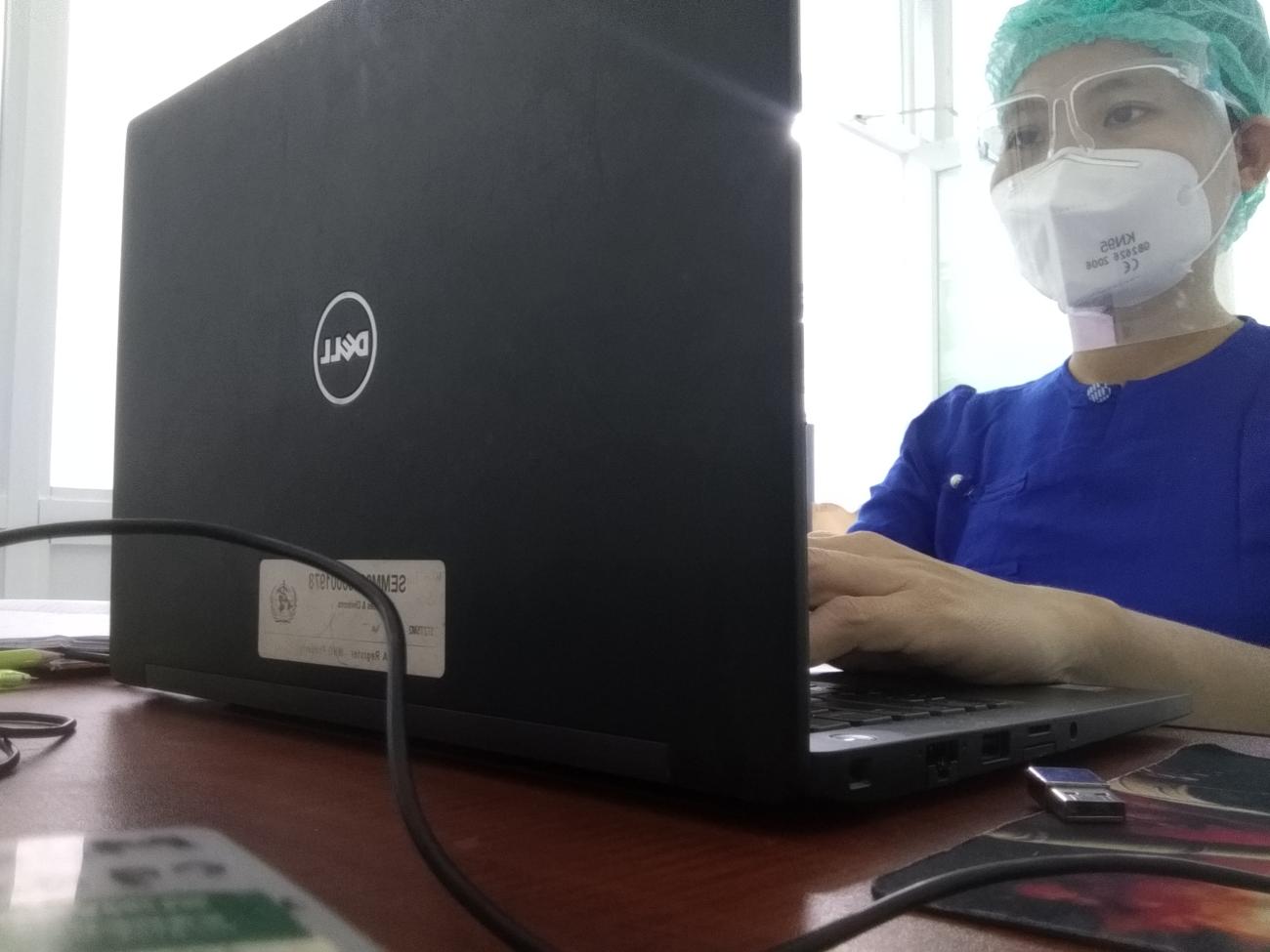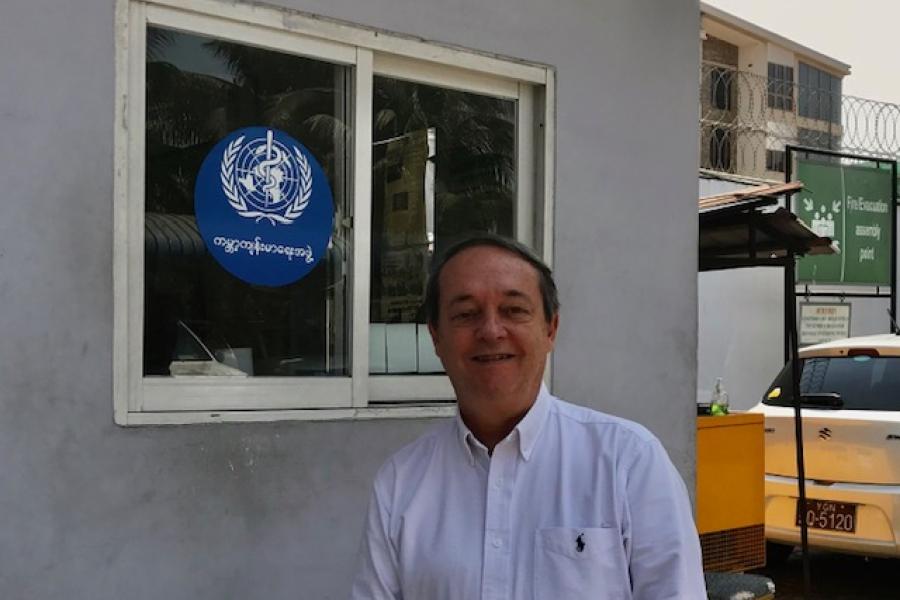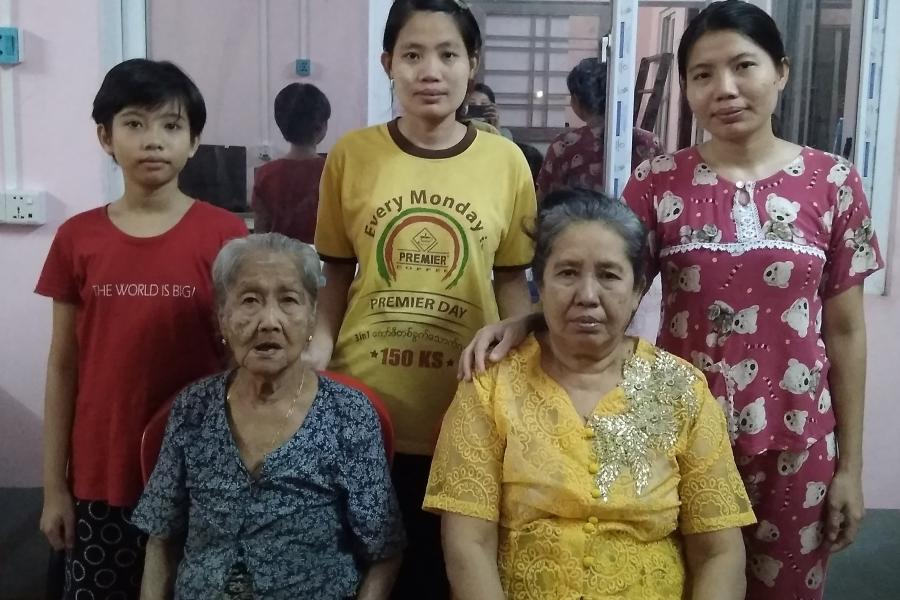Courage in the eye of the storm

The WHO in Myanmar turns to its virus experts to respond to the COVID-19 crisis.
The United Nations in Myanmar has more than 20 agencies working on the COVID-19 response. They have come together as one to support every aspect of the Government’s plan to protect lives and support livelihoods.
YANGON: It’s a lonely, dangerous place, the eye of the hurricane.
But that’s where 32 year old Yangon computer studies graduate Myat Mon Yee has been for the past six months.
Every day since March, when she was hired by the UN health agency WHO, Myat Mon Yee has been working at the South Okkalapa Hospital in Yangon, which was planned to be the Women’s and Children's Hospital but has been transformed to a COVID treatment centre.
Front line health workers throughout the world have been contracting COVID-19 at a higher rate than almost any other group, except perhaps the elderly. Many doctors, nurses and administrative staff have died.
Not surprisingly Myat Mon Yee was initially quite concerned about working with an infectious disease about which very little was known - except it was killing people and making others very sick.
“I was concerned that I might also get infected. Everyone was afraid,” 32 year old Myat Mon Yee from South Dagon Township in Yangon says.
“But I thought about other health personnel and charity workers who were willing to work, and even volunteer, and that took some of my fear away.
“And when I started work I found that the facilities were very well taken care of which allayed my fears.
“The doctors at the hospital are very caring and WHO has given me great support, including allowing me to get taxis to work.”
Myat Mon Yee is a data collector.
Since the coronavirus outbreak was first reported in China in late December 2019, Myanmar’s Ministry of Health and Sports (MoHS) has successfully led the country’s national response to keep its citizens safe from the deadly virus.
Working alongside the MoHS, multiple UN agencies in Myanmar , including WHO and partners, have remained key allies since day one. The WHO and UN took a whole-of-society and whole-of-government approach to fight COVID-19.
This UN interagency partnership has to date supported the central committee to establish response systems and processes to contain the spread of the virus in Myanmar.
In any national health emergency Government and health workers must have highly reliable, data.
The Team Leader of the WHO HIV, Viral Hepatitis and TB teams in Myanmar, Dr Fabio Caldas de Mesquita says: “Data is the light at the end of the tunnel.”
“We need to know how many people are being treated and how many beds are available for new patients. We need to know a little about the patients’ gender; age; the state of their illness, and of course where they live and who they had been meeting.
“We also need to know how many tests are being done, and how many test kits remain available.
“We need to know what drugs are being used by the patient; what protective equipment is needed for health care staff; and how many staff are working on treatment and response.
“These apparently are just “numbers” but they are key to decision-making during the crisis,” Dr de Mesquita says.

In February it quickly became apparent that the Ministry of Health and Sports did not have enough people to undertake this technical role.
Although it had many experienced staff undertaking treatment and case management, it had very few people to manage data in hospitals. So WHO hired three people immediately to work in hospitals – including Myat Mon Yee, from South Dagon Township in Yangon.
"You need to be brave to work in infectious diseases,” says Dr de Mesquita.
“Many applicants for jobs in Myanmar refused the work when they discovered they were going to be working on COVID-19 at hospitals.
"This was the same in 1987 when I began working with HIV and we didn’t know exactly how it infected people."
Myat Mon Yee has become more comfortable working in the COVID-safe environment. At work she wears a mask and face shield and carries sanitizer and frequently washes her hands.
She is provided with protective clothing including a cap and gown and the facilities are regularly disinfected.
But at home, where Myat Mon Yee lives with her 95 year old grandmother; her 70 year old mother; and her sister and niece, it’s also extremely important to ensure the virus doesn’t spread.
“When I get home, I don’t talk to anyone. I immediately shower and soak my clothes in soapy water.
“I spray disinfectant on all my things with a disinfectant bottle kept at the entrance.
“I stay isolated for an hour and in fact have become used to staying away from my family,” Myat Mon Yee says. She leaves home only to work and shop.
“I don’t see my friends much.”

WHO has been working with epidemics and infectious diseases in Myanmar for many years.
At the beginning of 2020 it had about 200 seconded staff working in all regions of Myanmar and almost all of them were working on different types of infectious diseases. These people are paid and supervised by the WHO but are seconded to the Ministry of Health and Sports.
WHO has been working on HIV-Aids; Viral Hepatitis, Tuberculosis, Malaria, vaccines of preventable diseases and other health initiatives.
Dr Fabio says the HIV program targets to control the Aids epidemic is completely on track, with a great commitment from the Myanmar Government with allocation of drugs (antiretrovirals) for treatment of HIV/AIDS.
"It has also funded a Hepatitis C project since 2017 and it has treated nearly 7000 patients.
"The viral hepatitis illness is transmitted mostly by people who use drugs who share dirty needles, but treatment can completely cure the patient,” he says.
There’s no cure for COVID-19, and the second wave in Myanmar is very worrying for Myat Mon Yee.
“The recent increases in the infection rates have made me very anxious.
“I am happy to be able to contribute to the Government and WHO’s response, and am grateful for this opportunity.
“But I worry about other health workers.
“They are becoming fatigued.
“We just hope the patients will recover quickly from COVID.
“I want the pandemic to be over soon and that everyone can be safe.”
If you liked this story you might also like this: UNODC supports parents and caregivers in IDP camps in Kachin State, Myanmar, to keep families safe during COVID-19 pandemic



